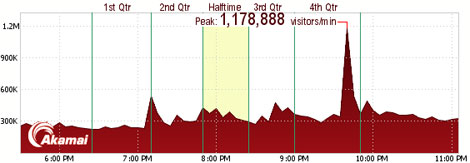
Data from content delivery provider Akamai shows an enormous spike in Internet traffic late in the fourth quarter of Sunday's Super Bowl, and domain registrar Go Daddy says the burst of traffic was tied to its ad spot during the two-minute warning. That's the moment at which Akamai's Net Usage Index surged to nearly double its highest previous level during the big game.
Go Daddy has become one of the most recognized advertisers in recent Super Bowls with its trademark "edgy" commercials. The Scottsdale, Ariz. company has cultivated controversies about whether its ads would meet network standards, driving traffic to its web site to “see more” in unrated “Internet-Only” versions.
“Everything came together beautifully this year,” said Go Daddy CEO and founder Bob Parsons. “We had a tremendous surge in Web traffic, sustained the spike, converted new customers and shot overall sales off the chart. This is a textbook Super Bowl campaign for Go Daddy.”
As usual, the ads were roundly panned by critics, but Parsons says the visits from voyeuristic TV watchers translate into new sales of domains and web hosting products. “We signed up more new customers than any other Super Bowl Sunday in our six year history and set a sales record too.”
The Super Bowl ads have been a factor in the phenomenal growth of Go Daddy, which hosts more sites than any other hosting company in the world, manages more than 39 million domains and has 7.5 million customers. It is the best known brand in the booming domain industry, largely through a promotional strategy that has blended high-profile ad campaigns with savvy use of new media, including blogs and podcasts.
Go Daddy’s breakthrough moment came in 2005, when its provocative Super Bowl commercial featuring WWE diva Candice Michelle generated controversy. After the ad aired in the first quarter, NFL executives pressured Fox to cancel a scheduled second showing of the company’s edgy commercial. The broadcast monitoring firm MultiVision estimated that the Super Bowl controversy supplied Go Daddy with the equivalent of $11.7 million in free publicity. Go Daddy saw a huge surge in domain registrations in 2005.
See NewTeeVee for additional coverage of Internet traffic data related to Super Bowl advertising.




